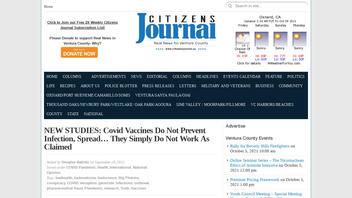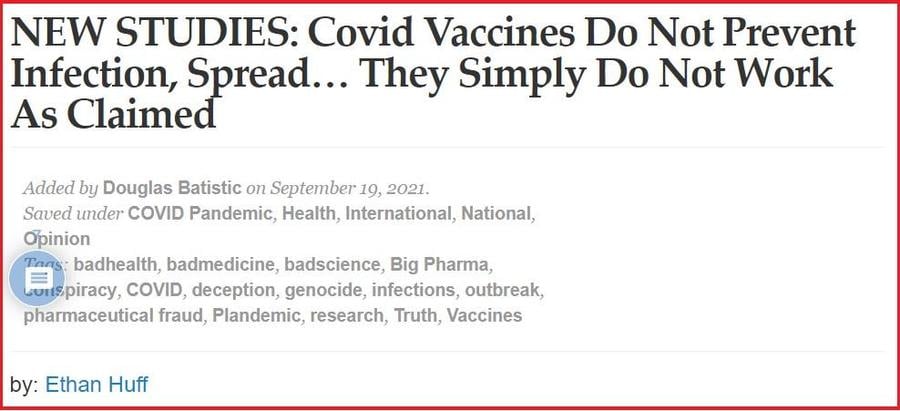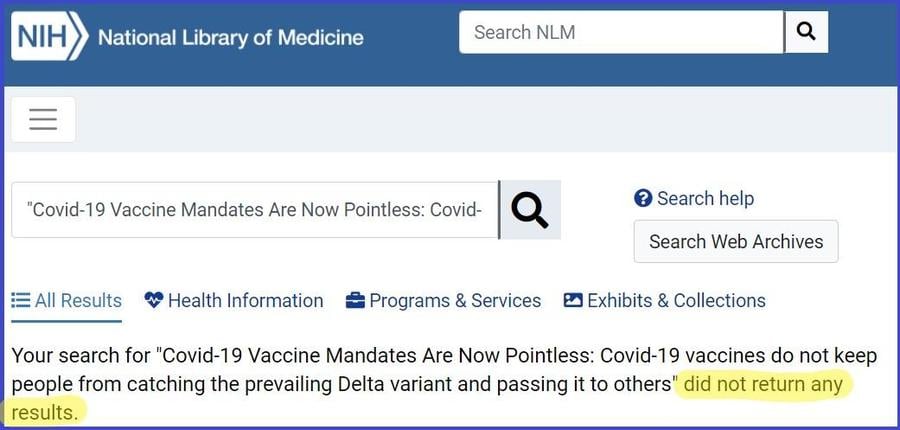
Does a collection of "new studies" on COVID-19 prove vaccines are not working as claimed? No, that's not true: The claim rests on the false premise that vaccine makers and public health officials promised 100% prevention. No responsible scientist made such a promise. Quite the opposite: Medical and public health experts cautioned early in the pandemic that no vaccine against viral infection is perfectly preventive. The vaccines have proven effective in preventing most infections and in reducing symptoms in those infected after vaccination, all of which slows spread of the virus, which is the point of vaccination.
The claim also calls a circulating pdf file "published" and "a study" although it has not been peer-reviewed, not been accepted by a trusted journal of medical science and includes false claims. Among those: that COVID vaccines are more likely to make people sick than to make them immune, an unproven claim wildly at odds with multiple peer-reviewed studies in major journals of medical science.
The claims appeared in a September 19, 2021, article (archived here) published by Citizens Journal titled: "NEW STUDIES: Covid Vaccines Do Not Prevent Infection, Spread...
It opened:
They Simply Do Not Work As Claimed
This is how the article appeared on October 8, 2021:
False Claim: COVID-19 vaccines don't prevent infection and spread of COVID-19
The medical professionals with relevant expertise who are monitoring the course of the COVID pandemic in the U.S. cite multiple studies that show vaccination rates correspond directly to reductions in the spread of the disease and to lab and clinical studies that show most people vaccinated against COVID do not get COVID.
Here is the Centers for Disease Control and Prevention's web page about vaccine effectiveness and here are studies on which the CDC bases its declaration that vaccines work:
- Effectiveness of the Pfizer-BioNTech and Moderna COVID-19 Vaccines among Healthcare Personnel -- Interim Estimates - 33 U.S. sites, January - March 2021
- Effectiveness of Pfizer-BioNTech and Moderna Vaccines Against COVID-19 Among Hospitalized Adults Aged ≥65 Years -- United States, January-March 2021
- Interim Estimates of Vaccine Effectiveness of BNT162b2 and mRNA-1273 COVID-19 Vaccines in Preventing SARS-CoV-2 Infection Among Health Care Personnel, First Responders, and Other Essential and Frontline Workers -- Eight U.S. Locations, December 2020-March 2021
- Effectiveness of the Pfizer-BioNTech COVID-19 Vaccine Among Residents of Two Skilled Nursing Facilities Experiencing COVID-19 Outbreaks -- Connecticut, December 2020-February 2021
False Premise: COVID-19 vaccines "Do Not Work As Claimed"
The Citizens Journal cites no examples of vaccine makers or public health officials claiming 100% effectiveness. The public record amply demonstrates no claims of perfection were made.
The CDC's page on vaccinations makes the point bluntly:
As expected, because no vaccines is 100% effective, infections in fully vaccinated persons (e.g. breakthrough infections) have been observed, albeit at much lower rates than infections among unvaccinated persons
In its initial approval of the Moderna vaccine, the Food & Drug Administration (FDA) spelled it out as follows:
FDA's analysis of the efficacy data from 28,207 participants 18 years of age and older without evidence of SARS-CoV-2 infection prior to dose 1 confirms the vaccine was 94.1% effective (95% confidence interval (CI) 89.3, 96.8) in preventing COVID-19 ...
When approving the Pfizer vaccine for emergency use, the FDA was similarly plain that the vaccines are not 100% effective:
... vaccine efficacy after 7 days post Dose 2 was 95%, (95% CI 90.3; 97.6) in participants without prior evidence of SARS-CoV-2 infection and >94% in the group of participants with or without prior infection. Efficacy outcomes were consistently robust (≥93%) across demographic subgroups. Efficacy against severe COVID-19 occurring after the first dose was 88.9%
Across the internet, health education materials such as this "Why aren't all vaccines 100% effective" page from the College of Physicians of Philadelphia, explain that vaccine campaigns use less-than-perfect vaccines in order to reduce the number of hospitable bodies in which viruses can propagate, reducing the odds of retransmission:
Vaccines are designed to generate an immune response that will protect the vaccinated individual during future exposures to the disease. Individual immune systems, however, are different enough that in some cases, a person's immune system will not generate an adequate response. As a result, he or she will not be effectively protected after immunization.
False Claim: One "study" cited is an essay, not clinical or lab research and not published in any professional science journal
The link provided in the Citizens Journal article takes the reader to a pdf of an essay by a psychiatrist, Dr. Nina Pierpont, who lists her specialty as behavioral pediatrics and adult psychiatry and psychotherapy. Her article does not appear in any science journal, according to the National Library of Medicine, which indexes a million titles.
(Source: NLM.NIH.GOV screenshot taken Fri Oct 8 21:51:24 2021 UTC)
The essay in the pdf includes conclusions not reflected in the consensus of opinion among doctors treating COVID patients in clinics and medical researchers in virology and immunology who have hands-on experience with the virus. In summary, she declares:
Since the principal reason for COVID-19 vaccine mandates--protecting others from infection--has evaporated with the ascendance of the Delta variant, those who mandate COVID-19 vaccines may wish to seek legal counsel regarding their culpability and liability (including personal) for potential long-lasting harm to those whom they pressure into vaccination with threat of exclusion from employment or education or other public activity.
Experts in the field have concluded the opposite: that vaccination greatly reduces the severity of delta variant infections and that there is wide variability in the effectiveness of natural (post-infection) immunity, depending on viral loads and individual immune system variations. UCLA virologist Dr. Otto Yang documented this in his most recent study: "Primary, Recall, and Decay Kinetics of SARS-CoV‐2 Vaccine Antibody Responses"
Misleading Claim: That a CDC study found "the vast majority of new cases" are vaccinated people
The CDC "study" referred to is not a full-fledged medical study. It was a surveillance report on the outbreak of delta variant COVID among participants in a Provincetown, Massachusetts, festival over the July Fourth holiday weekend, an event that alerted public health officials that delta variant infections carried a big viral load, which challenges the immune systems of even those with full vaccination.
The CDC on July 31, 2021, revised its guidance on masks, saying that field work at the sites of delta variant outbreaks indicates vaccinated people exposed to the delta variant can carry -- and spread -- as much viral material as the unvaccinated. The CDC did not say vaccinated infected persons carry more viral load than the unvaccinated. Here is the wording from the July 31 CDC statement:
Delta infection resulted in similarly high SARS-CoV-2 viral loads in vaccinated and unvaccinated people. High viral loads suggest an increased risk of transmission and raised concern that, unlike with other variants, vaccinated people infected with Delta can transmit the virus.
Since then, the CDC has reported that almost all new cases of COVID are in unvaccinated persons. CDC Director Dr. Rochelle Walensky has publicly said the pandemic in the U.S. is now almost entirely a pandemic of the unvaccinated, with the unvaccinated 11 times more likely to be infected than the vaccinated.



















